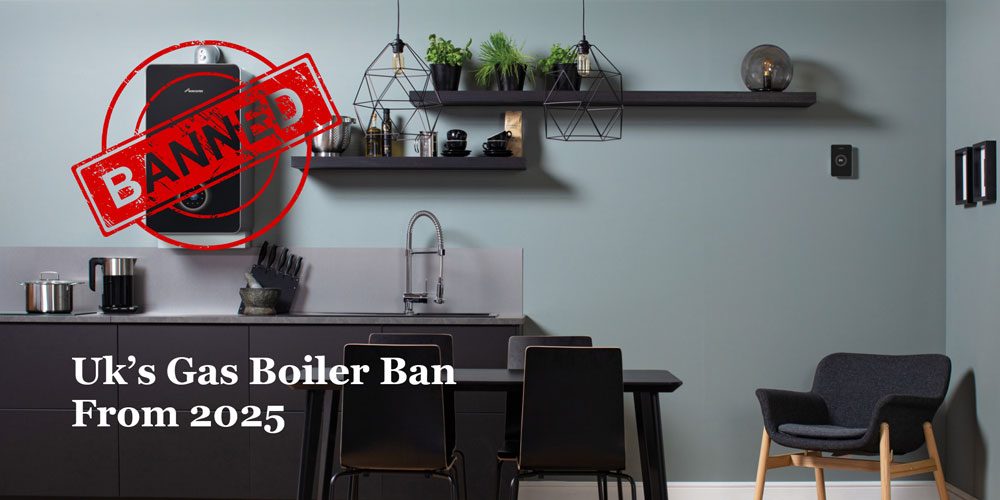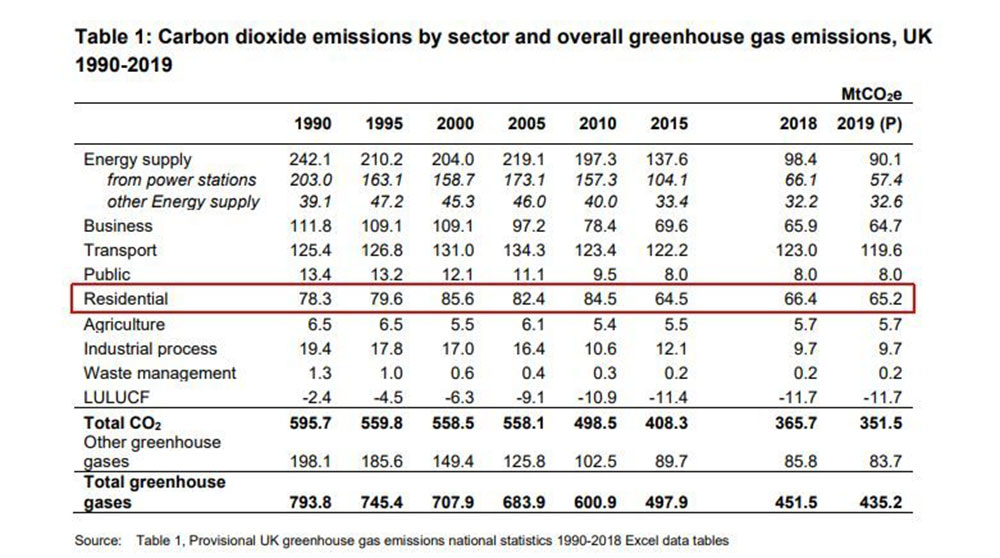How Does the Gas Boilers (2025) Ban Affect You?
You’ve probably already heard about the gas boiler ban of 2025. But if you’re wondering how it will affect you, what will replace natural gas boilers, and have myriad other questions, you’re not alone.
Today, we help you to learn all you need to know about upcoming changes to the Building Regulations, and how they may affect our heating methods.

In early 2019, then-Chancellor Philip Hammond shell-shocked the British public with the pledge to ban gas heating from new build homes as of 2025. Several years and chancellors later, there’s been tonnes of speculation but little in terms of law to spell out the terms of the “gas boiler ban”.
In this post, we’ll walk you through everything we know about the gas boiler ban, how it will affect you, and what your alternatives will be.
Will Gas Boilers Be Banned?
There is currently no law on the books that imposes a blanket ban on gas boilers in 2025. All we know for certain, is that the Government has proposed changes on how we will heat new homes from 2025 onward, and certain efficiency requirements will be gradually raised in the near future.
The actual “ban” will be promulgated in 2025 in the Future Homes Standard, a document that’s set to change Parts L (conservation of fuel and power) and F (ventilation) of the Building Regulations. If passed into law, the Future Homes Standard will require new homes to give off 75-80% less Carbon Dioxide (CO2) emissions than those built to current code.
As a stepping stone to the sweeping changes we may see in the next few years, the Government plans to raise the energy efficiency standards for new homes with changes to Building Regulations in 2020. As of this post’s publication time, the Government tells us that it’s still analysing public feedback it received on the new boiler regulations of 2020.
Why are Gas Boilers Getting Banned?
Gas boilers may end up being banned because they emit CO2 into the atmosphere, which ultimately contributes to climate change. Yes, the natural gas we use to heat our homes is cleaner than oil and other (now banned) fuels, but it’s not entirely clean.
What kind of fuel does your boiler use?
Fixed price online with next day installation
For example, in 2019, the UK produced 351.5 million tonnes (Mt) of CO2 (and 435.2 Mt of all greenhouse gases); here’s a breakdown of their sources:
- Transport – 119.6 Mt
- Energy supply – 90.1 Mt
- Residential – 65.2 Mt
- Business – 64.7 Mt
- Public – 8.0 Mt
- Agriculture, industrial, and waste management – 15.6 Mt.
As we can see, the UK’s homes were the third largest producers of CO2, behind only transport and power generation, with 18.5% of all emissions! This domestic CO2 mostly came from burning fuel for heating and cooking — 2 activities that largely use natural gas.

With the Government’s binding resolution to cut all greenhouse gas emissions to net-zero by 2050, there’s a long, tough road ahead. Consider this: since 1990, we’ve only slashed our greenhouse gas emissions by 45%. Climate change won’t wait for us to get our act together — in the exact same timespan, heat waves in the UK, for instance, have doubled in length.
To this end, the Committee on Climate Change (CCC) states in its report “Net Zero: The UK’s contribution to stopping global warming” that achieving the net-zero target will entail full decarbonisation of the country’s buildings by 2050. And that’s how fossil-fuel heating wound up on the shorter-term hit list – the same CCC, in the same report, recommends not connecting new homes to the gas grid after 2025.
Will I Have to Use Low-Carbon Heating Systems?
If you’re not planning to move into a newly built home, then the proposed boiler ban will not affect you in any way.
On the other hand, if you’re looking to buy or construct a new home after the ban takes effect, you’ll have to turn to approved, renewable methods to heat your home. That’s because the ban will only extend to fossil-fuel-fired heating mechanisms in new-build properties.
With this in mind, our next question is:
What Will Replace Gas Boilers in 2025?
If the proposed ban on fossil-fuel does forge ahead as planned, you’ll need to find a new means of heating your new home. Luckily, several viable, renewable methods already exist. Another handful are already in the planning stages, though their implementation may take a while.
The Future Homes Standard consultation package predicts that most homes will turn to heat pumps, heat networks, and to some degree, direct electric heat.
1. Heat Pumps
This may surprise some folks, but we’ve been using heat pumps for quite a while. Chances are, you have two in your home already: your fridge and your air conditioner. Like all heat pumps, these devices extract heat from one place and reject it into another.
How heat pump technology works:
- a compressor circulates refrigerant between two heat exchange coils;
- one coil evaporates the refrigerant at a low enough pressure that the resulting gas absorbs heat from the surrounding air;
- the heat-laden gas then makes its way into another coil, where it condenses at high pressure and emits the heat;
In this manner, fridges, air conditioners, and other heat pumps can absorb heat in one place and emit it in another. When you use this technology to heat your home in the middle of winter, the device will draw heat from the outside air (yes, even in frigid subzero temperatures, air contains a percentage of its room temperature heat) and release it inside.
In summer, the process can be easily reversed and the heat pump will function like any other air conditioner.
There are two types of heat pumps:
Air-source and ground-source. An air-source heat pump heat from outside air as we’ve described above. Meanwhile, a ground-source heat pump the latter, also known as earth-energy or geothermal heat pumps, absorb heat from the ground or groundwater before circulating it through the heating zones.
Both ground- and air-source heat pumps offer a brilliant, innovative way to keep your home comfortable year-round.
On the downside, the costs of buying a heat pump are quite prohibitive. Buying and installing an air-source heat pump will set you back somewhere between £5,000 and £8,000. If you favour getting your heat from the ground or groundwater, then you’re looking at a bill of £11,000-15,000.
The operating costs are a bit more reasonable. Air-source heat pumps typically need 1 kWh of electricity to give off 3 kWh of heat. With an average UK household using 12,000 kW each year to keep warm, the need for electricity translates into 4,000 kW. At 14 p/kW, you’ll get an annual bill of £560.
Overall, if you can absorb the upfront costs, a heat pump is a reasonable alternative to gas boiler systems.
2. Heat Networks
The CCC estimates that by 2050, 18% of the UK’s heat will have to come from heat networks if we’re serious about the net-zero emissions target.
What are heat networks?
Also known as district heating, heat networks supply heat to consumers via a system of underground pipes that carry hot water from a central source. These networks may be limited to serve a small cluster of buildings, or span an entire city.
The heat source, or energy centre, may either be a dedicated heat plant or draw surplus heat from some other industrial process. Some feasible central heat source examples include:
- power station
- waste facility
- Combined Heat and Power (CHP) plants
- fuel cells
- Air- and ground-source heat pumps
- electric boilers
- geothermal sources
- solar arrays
How heat networks work
Plugged into a heat network, each building would receive heat through a heat exchanger the size of a small boiler. The controls would remain the same as with conventional wet central heating, so each household could monitor and adjust their ambient temperature.
One handy feature of heat networks is that their heat source is readily interchangeable for a greener version, thus decarbonising the entire grid. Contrast this with the thorny ordeal of changing gas heating in individual homes.
As well, heat networks may be able to recover waste heat – a major leap toward the carbon-neutral future.
All that being said, as of 2018, the UK’s heat networks supply heat to 500,000 consumers, accounting for 2% of the overall heat demand. That’s a long way to go toward hitting the 18% target, considering the massive infrastructure projects needed to make this happen.
So, if you’re hoping to hook up your new home to a heat network in time for the boiler ban in 2025, best not to hold your breath.
3. Direct Electric Heating
In the context of net-zero carbon, electric heat is not an ideal alternative to gas boilers. As we’ve seen before, most of the UK’s electricity is made by burning fossil fuels, so it’s mad to think electric heat is cleaner than gas. It is, and will be, “fossil-fuel heat” until our power generation methods change.
Apart from their less-than-renewable nature, electric heaters are also expensive to run. But we need not tell you this – you’ve seen your own electric bill.
That’s not to say that things can’t change. If renewable power means like solar panels see wider use, one can conceive that future, solar-equipped homes could produce electric heat at a lower cost.
But can it happen before the 2025 gas boilers ban? According to the Solar Trade Association, the UK already has nearly a million homes with solar panels.
With electricity costs on the rise and solar panel costs falling, it’s probable that more households will go solar in the near future.
4. Hydrogen Heating
Low-carbon gases like Hydrogen are often cited as the future of home heating. But despite being the most abundant element in the universe, Hydrogen is not easily extracted outside of a lab. The highly efficient solid-oxide fuel cells are expensive, and not widely available. The cheaper proton-exchange membrane fuel cells are only 75% efficient.
With current technology, for every 1 kW of electricity spent to produce hydrogen, we’d only get 0.92 kW or less by burning it in hydrogen boilers — hardly a viable way to heat new homes if the 2025 boiler ban becomes law.
5. Biomass Boilers
Strangely absent from the Future Home Standard consultations are biomass boilers. They give off way less carbon than their gas and oil peers, and their fuel comes from a renewable source! Seems like a grand alternative to costly fuel cells, dirty electric heat, and heat networks that aren’t there.
Biomass boilers function like any other boiler we’re accustomed to in the UK. But they come with one distinct feature: instead of burning carbon-laden oil or gas, they rely on wood products for combustion.
Benefits of wood fuels:
- First, it gives off way less CO2 when burnt. Wood-fired boilers emit 550-770kg of CO2 in the course of a year, whereas gas boilers – the next cleanest technology – produce a staggering 6,400 kg of CO2. That’s ten times more.
- Second, it’s carbon-neutral. Growing trees destined for a biomass boiler’s combustion chamber absorb the CO2 given off by older trees as they burn.
- Finally, it’s renewable: the species used to produce biomass fuel can grow fast enough to replace trees as they’re cut.
But biomass boilers won’t work for everyone. For one, they’re gigantic. Smaller homes just don’t have enough space to accommodate them or their fuel (imagine a tonne of wood chips sitting around in a London bedsit?). Also, they’re not cheap. The lower-end, hand-fed models cost upwards of £5,000, while the fully automated ones can command a price upwards of £13,000. In contrast, Heatable can hook you up with a top-tier Worcester Bosch boiler from as little as £1,649.
Other Possible Building Regulations Changes
Switching to carbon-neutral or low-carbon heating is only a part of the Government’s plan for curbing net emissions. The other — equally important — piece of the puzzle lies in the fabric of our homes. Older buildings that have not had an energy retrofit lack the airtightness and insulation efficiency to control heat loss well. The more heat these buildings lose, the higher the load on their heating system, the more Carbon Dioxide ends up in the atmosphere.
From the new boiler regulations 2020 update to Building Regulations, to the obscure 2025 Future Homes Standard, the Government wants to change how we build homes to reduce the output of our heating systems. The changes will likely enhance the airtightness of the envelope and mandate triple glazing in windows.
Can I Get a New Boiler for My Existing Home After 2025?
We know very little about what the “boiler ban” will look like when and if it’s passed. So far, the Government seems intent on banning fossil-fuel burners in new builds only; so, if you want to fit a new boiler in an existing home or a home that will get its Certificate of Occupancy prior to 2025, then there’s nothing on the books to stop you.
Should I Still Replace My Gas Boiler?
While we may soon see some efficiency standards raised in parts of the Building Regulations, now is a great time to get a gas boiler. In fact, until renewable technologies get handier, more efficient, and cost less, gas boilers will remain the greenest and cheapest heating method. What’s more, there are Government schemes that will actually help you pay for a gas boiler if you apply for them now.
Check out Heatable’s post on the Boiler Grant (available to eligible homeowners with mains gas) and do some research on the Green Homes Grant scheme to find out more.
And if you’re looking for an efficient gas boiler, you can get an online quote from Heatable — the online installer has a range of models from Worcester Bosch, Viessmann, Ideal, and other quality brands.

Gas Boilers 2025 Ban: Conclusion
Well there you have it: Nobody’s forcing you to do anything about your heating in 2025 as of yet, but new builds will likely steer well clear of the gas boiler. We stand to gain much in terms of carbon-neutrality and a brighter future–and not to mention more efficient heating costs. Ultimately, we won’t know fully about the so-called gas boiler ban until it comes up for further discussion in a few years.
What do you think of the UK’s push against climate change? Are you planning your gas boiler replacement in anticipation of low-carbon heating? Leave us your thoughts in a comment below.

“…since 1990, we’ve only slashed our greenhouse gas emissions by 45%…” Or you can look at it in a more positive way and say that, since 1990, we’ve slashed our greenhouse emissions by almost half. That may not be enough, but it’s a solid start, and better than many. However one has to wonder exactly what difference any cuts made in a country the size of the UK can possibly make to climate change overall with China building so many new coal-powered power stations.